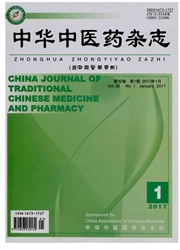

 中文摘要:
中文摘要:
目的:探讨解毒三根汤(虎杖根、水杨梅根、藤梨根)对肿瘤相关成纤维细胞(CAFs)的血管内皮生长因子(VEGF)、白介素-6(IL-6)的影响以及对Caspase信号通路的探讨。方法:BALB/c小鼠皮下接种CT-26结肠癌细胞(1.2×10^6m L);随机分为3组:正常对照组、模型组、解毒三根汤组,ELISA检测3组CAFs上清液中VEGF、IL-6的表达量,实时荧光定量PCR检测各组CAFs中Caspase-3、Caspase-8的m RNA表达量。结果:24h及48h解毒三根汤组刺激的CAFs上清液中VEGF、IL-6的表达量较模型组显著降低(P〈0.01);解毒三根汤组Caspase-3、Caspase-8 m RNA表达量较模型组明显上升(P〈0.01)。结论:解毒三根汤降低CAFs上清液中VEGF、IL-6的表达量,提高CAFs中Caspase-3、Caspase-8 m RNA的表达量,可能是其抑制肿瘤细胞迁移侵袭的机制。
 英文摘要:
英文摘要:
Objective: To observe the effect of Jiedu Sangen Decoction (JSD, consisting of Polygonum cuspidatum, Geum japonicum thumnb, Radix actinidiae) on the expression of carcinoma-associated fibroblasts (CAFs) such as vascular endothelial growth factor (VEGF), IL-6 and caspase signal pathway. Methods: The BALB/c mice were subcutaneously inoculated with colon cancer CT-26 cells (1.2×10^6mL) and then randomly divided into 3 groups, a normal control group, a model group, a JSD group. The expression of VEGF and IL-6 in the supernatant of CAFs was detected by using ELISA. The mRNA expression of caspase-3 and caspase-8 was detected by real-time fluorescence quantitative PCR. Results: Compared with the model group, the expression of VEGF and IL-6 in the supernatant of CAFs decreased in the JSD group at 24h and 48h (P〈0.05, P〈0.01). The mRNA expression of caspase-3 and caspase-8 in the JSD group increased obviously compared with the model group, and the difference was statistically significant (P〈0.01). Conclusion: JSD could decrease the expression of VEGF and IL-6 in the supernatant of CAFs, and increase the mRNA expression of caspase-3 and caspase-8. This might be possible mechanisms for inhibiting the migration and invasion of tumor cells.
 同期刊论文项目
同期刊论文项目
 同项目期刊论文
同项目期刊论文
 期刊信息
期刊信息
